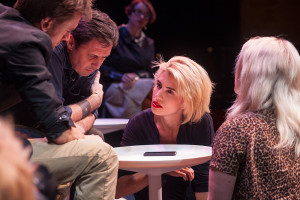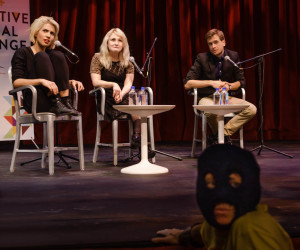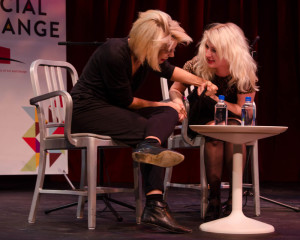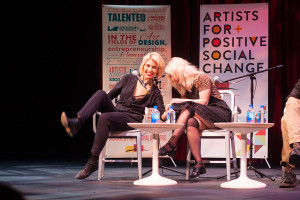Tags
Related Posts
Share This
Pussy Riot
No hooliganism this time…except for maybe a few giggles and tickles.
Nadezhda Tolokonnikova (Nadya) and Maria Alyokhina (Masha), founding members of the female punk band Pussy Riot, graced the stage at the Greer Garson Theater at SFUAD May 7 to a packed auditorium of students and community members.
The highly anticipated event was created in collaboration with SITE Santa Fe for its 20th anniversary and SFUAD, as part of the Artists for Positive Social Change initiative.
The evening began with SFUAD Dean of Visual and Communication Arts Linda Swanson and SITE Director of Education and Outreach Joanne LeFrak welcoming the audience, thanking the university and SITE for the collaboration and providing some background on Pussy Riot for those audience members not in the know. Then Nadya, Masha, their translator Pyotr (Peter) Verzilov and moderator Ellen Berkovitch of adobeairstream.com took the stage to uproarious applause and a standing ovation.
The talk centered on a wide range of social issues and topics, including Russian president Vladimir Putin; the girls’ inspiration and influences in founding Pussy Riot; their recent work in advocating for prisoners’ rights; and the group’s famous use of balaclava masks to preserve their identities during protests.
“It’s like creating another figure, another identity,” Masha explained.
Having created a media image of steely eyed social activist riot grrls, it was refreshing to view Nadya and Masha mess around with each other like two friends, tickling and laughing. The duo offered up jokes and hilarious insight into Berkovitch’s questions, spurring the audience to laughter.
“This is our reaction to intellectual talking,” joked Masha as she and Nadya arm-wrestled.
But when the question called for it, the two answered truthfully and with engaging insight, sometimes assisted in translation by Verzilov, who is also Nadya’s husband.
Midway through the evening, the talk shifted to discussion of their first English language video, entitled “I Can’t Breathe” after Eric Garner’s final words before he was killed in a chokehold by NYPD police. The music video shows Masha and Nadya being buried alive. The two said they had been following police violence in the States and wrote the song in reaction to this particular incident while visiting in New York. They then extended the metaphor of breathlessness to encompass Putin’s uniform control and authority over what people and artists in Russia can and cannot do.
“He took the initiative from us and that’s why we couldn’t breathe,” Nadya said.
Masha agreed, noting that “we saw parallels between how we feel and how this man felt.”
Throughout the talk, Verzilov remained very involved, not only offering translation but also supplementing with stories and opinions of his own.
The talk concluded with a Q&A in which audience members posed questions to the pair, such as how being called “international celebrities” has affected them.
“It doesn’t matter what they call you because people can call you asshole or celebrity, it doesn’t matter,” Masha answered to light applause from an appreciative audience.
Another interesting question came from Brian Kelley, who asked if working either inside or outside Russia to create change had different impacts.
“Influencing from the outside is a little too imperialist in logic,” chided Masha, with Nadya adding “we do feel we have to work from the inside.”
Perhaps one of the most powerful statements of the night came in answer to a balaclava-clad audience member’s question regarding why the two girls didn’t simply apologize to avoid being sent to prison.
The answer: “Because then we would have been in a prison we would have never been freed from.”
The group Pussy Riot, composed of approximately 11 members, have been vocal opponents of Russian President Putin since their formation in 2011, particularly the fact that he was allowed to continue as president for a third term and his connection to the Russian Orthodox Church. The group are also proponents of LGBT rights and feminism in traditionally conservative Russia.
The world first came to know the name Pussy Riot in 2012 when Nadya, Masha and a third member of the group, Yekaterina, were arrested after filming a protest performance piece inside the Cathedral of Christ the Savior Church in Moscow. They were convicted for “hooliganism” and sentenced to two years in prison. This attracted substantial interest from Western media regarding the suppression of LGBT and feminist viewpoints in Russia and many people came out in support of the women in prison and Pussy Riot overall.
Since their release, both Nadya and Masha have continued to face dissent from the Russian public and government, particularly around the time of the Sochi Olympics in February 2014.
“They look at us more carefully than before,” Nadya noted about their release from prison and subsequent actions.
Furthermore, around the time of the Sochi Games, Pussy Riot put out a release saying that Nadya and Masha were no longer members but that they supported their new endeavors, which were heavily focused on prisoners’ rights. Nadya and Masha have not commented and, due to the pair’s involvement with a planned performance at Sochi, a clear answer is not forthcoming.
At the press conference after the talk, members of the press honed in on issues not discussed in the public Q&A.
In answer to a student question submitted by Charlotte Renken about how the average US citizen can affect change in Russia and in opposition to Putin, Nadya and Masha offered differing but equally important answers.
“It’s very important in politics to not always take the compromise,” said Masha with translation by Verzilov, taking the political stance on the issue. “It would be very great if idealist interests can be more important than businesses.”
Nadya discussed the human side of that coin, saying it was important to show compassion and solidarity with the Russian people.
“If you see a Russian here [in the US] give them a hug,” she said, even recommending that people hoping to influence change should “come to Russia and talk with people” to help destroy negative cultural perceptions and pave the way for new understandings.

The artists/activists answered some questions in English, some in Russian with translation help from Nadya’s husband, Peter Verzilov. Photo by René Bjorheim.
After the press conference, Nadya and Masha gave the assembled press a bonus treat by phoning fellow artist Tania Bruguera, who was recently detained in Cuba over a performance art piece about expression and freedom of speech. Gathered around the phone, the group discussed parallels between their work, as well as Bruguera’s battle trying to obtain a lawyer. There was even made mention of Cuban graffiti artist El Sexto being held in prison. The conversation was friendly and familial, with the three women expressing support for each other.
“You girls should come to Cuba for the biennial,” Bruguera said.
The Pussy Riot talk was the hot ticket in town for the evening, with regular tickets selling at $35 dollars a pop. SITE also offered $300 and $600 options that included the opportunity to dine with Nadya and Masha at a ritzy and delicious dinner at Bouche afterward. For students hoping to attend but unable to pay, a lottery for free tickets was offered and the event was live-streamed to the Forum.
However, some students criticized the event for its exclusivity, saying that if it were truly an event for “Artists for Positive Social Change,” all tickets should have been free or low cost and made available to students first before the general public.
“The whole point of A4PSC was to connect SFUAD artists with real people in the industry to allow them to soak in greatness and be inspired,” Marcus DiFilippo said on a comment thread on the SFUAD Student Life Facebook page. “DO NOT call this event artists for positive social change if you have no intention of making this totally accessible to students.”
On the day of the event and in the week leading up to it, however, tickets left over in the raffle were given away for free to students. SFUAD President Larry Hinz said that the school will continue to work hard to make events such as these available and open to students.
At the end of the evening, most people walked away from the talk having had a good time, and with an important message that everyone is capable of affecting change in the world.
“Everyone can be Pussy Riot,” Nadya said.









 Jackalope Magazine is the student magazine of Santa Fe University of Art and Design. Building on the interdisciplinary nature of our education, we aim to showcase the talent of our university and character of our city.
Jackalope Magazine is the student magazine of Santa Fe University of Art and Design. Building on the interdisciplinary nature of our education, we aim to showcase the talent of our university and character of our city.
Recent Comments